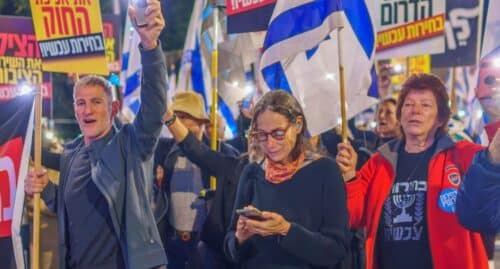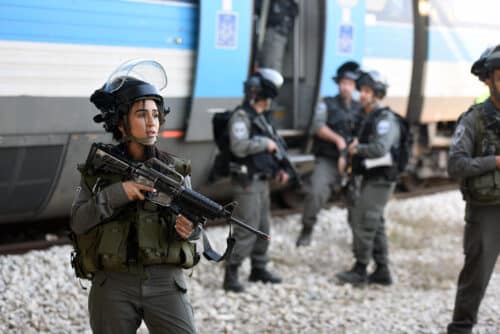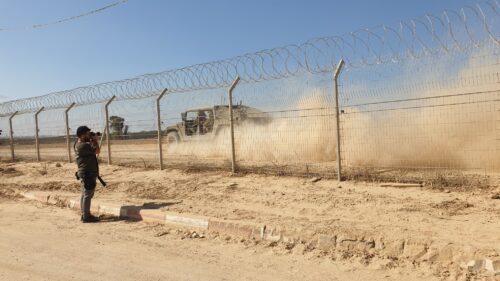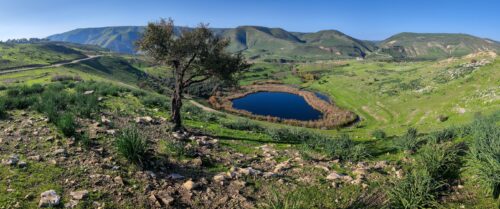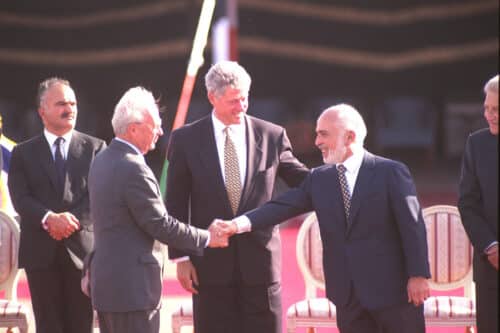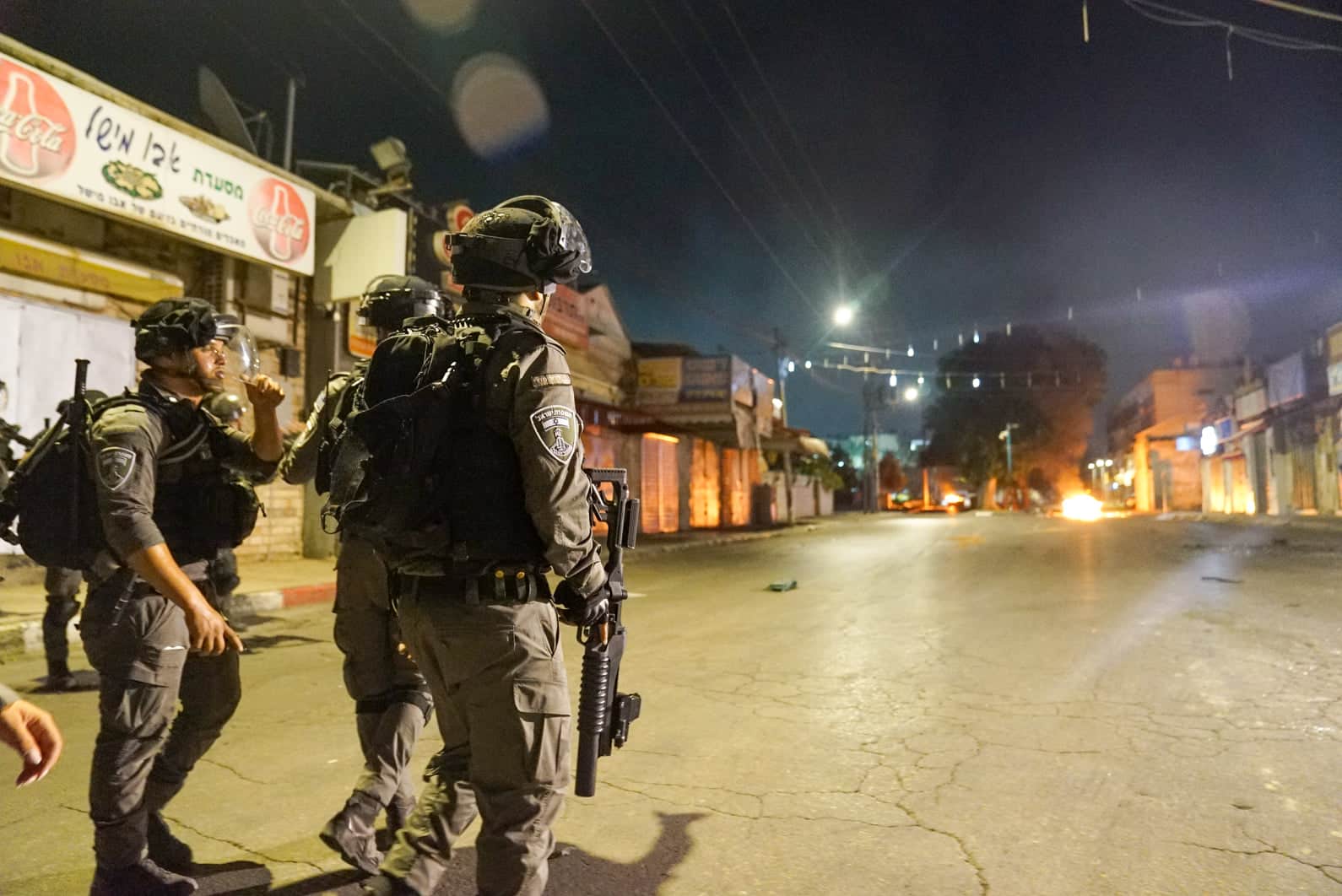
This interview with Yanir Melech, who was a special operations officer in the Judea and Samaria area in the days before Oslo and was known as “King of Manhunters in Judea and Samaria” (“Melech” means “King” in Hebrew), took place shortly after he finished another routine meeting with a business owner in a Galilee village.
Since leaving the Israel Security Agency (the ISA, or Shabak) in the 1990s, he has been working in security for businesses that are vulnerable to violence and other types of crime. This time, he says, the business owner had won a tender for constructing a building for a government institution and throughout the construction he was targeted for attack by those who lost the tender. Shots were fired at his trucks, his drivers were injured, his business itself came under fire, and when he persisted in the project, a grenade was thrown into his children’s bedroom and another into his brother’s living room.
“This isn’t an incident from Judea and Samaria, it’s from near Haifa, and it’s the same situation today all over the Arab sector in Israel. Gangs of masked men, armed to the teeth, are circulating freely in the Arab cities and towns, and the loss of control is nearly total. The police don’t have the resources for dealing with these attacks. If the ISA doesn’t enter the arena at full strength, the next ‘Guardian of the Walls’ will be a catastrophe.”
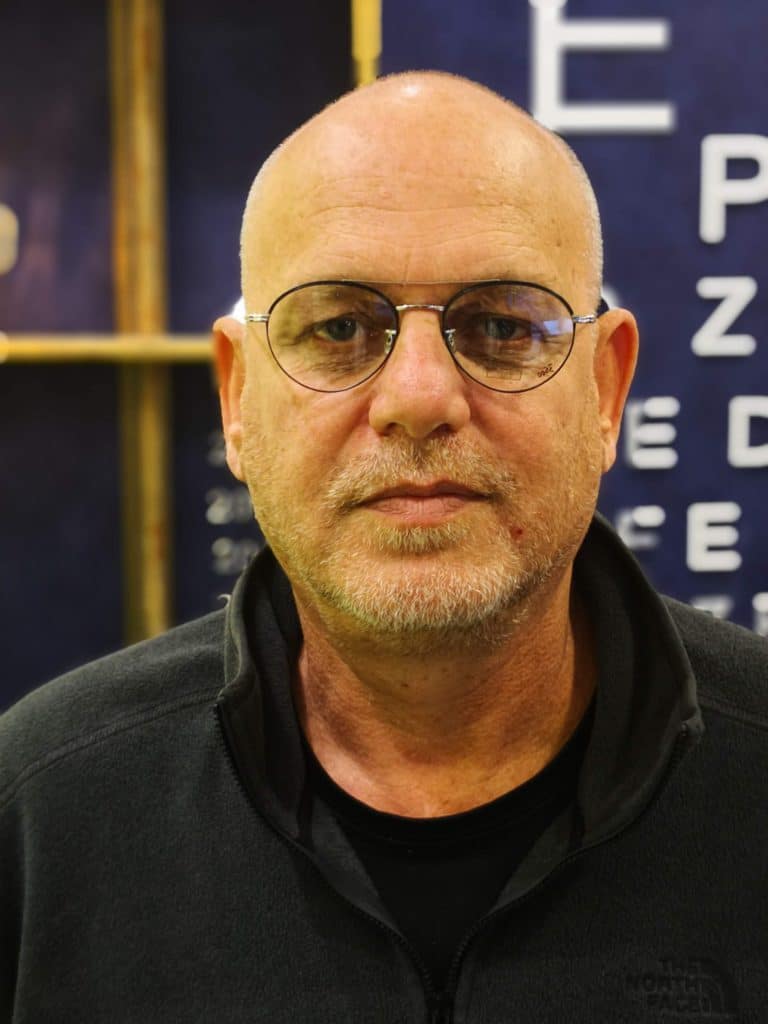
Melech, a military academy graduate, served in the Sayeret Matkal special reconnaissance unit and as a special operations officer in Lebanon and in the Judea and Samaria area, including Jenin. In view of his operations, he was described in the Kol Ha-Ir newspaper as “the West Bank Angel of Death.” After leaving the IDF, he served as a coordinator in the ISA; but a road accident contributed to his early retirement from there, shortly after the Oslo Accords — which had brought policy changes at the ISA that were significant and that ran counter to his security thinking.
Did you retire because of your injury or because of Oslo?
“Retiring made sense, because I didn’t believe in the Oslo Accords and I didn’t like the new instructions. One of them, for example, was to erase all members of Al-Fatah from the wanted list. When I was interviewed for work at the ISA, they asked me why I was applying and I said that I wasn’t willing for Jews to be killed for being Jews. But the new policy looked to me like letting Jews be killed and I had a problem with that. My retirement was welcome mutually, because my world view wasn’t compatible with theirs. In my opinion, the same kind of policy put the security forces off guard not just on October 7 but earlier as well — for the Yom Kippur War, the First Intifada, the Western Wall Tunnel confrontations in 1996, and the Second Intifada.”
Murder, kidnapping, and rape inside Israel
Besides his security work in the business sphere, he has also written a book, titled Crime Ltd. and published last Rosh Hashana, about organized violence in the business world and how that violence is linked to terrorist organizations. “The crime families are fed by the terrorist organizations and receive enormous quantities of weapons from them. That tells us what to expect in the next round of fighting. Sometimes they pull suspected collaborators out of their homes and kill them, kidnap them, rape their wives. There’s no law and no order. I’ve heard of cases where the victim is shot in the testicles to make sure that he won’t produce another generation. All this is happening today inside Israeli territory.”
How did we reach this point?
“The Jewish crime families suffered heavy damage from Case 512, where most of the heads of crime families in Israel were convicted. Then Arab crime families stepped into the vacuum. Jewish Israeli crime families usually include two or three brothers but the rest of the members aren’t relatives. Among the Arabs almost all the members of the crime family are also blood relatives and they hardly ever use subcontractors. For that reason it’s very hard for intelligence agents to penetrate Arab crime families. What’s more, many murders that have roots in crime become overlapped with vendettas and clan feuds. There’s also a connection with the change of generations in Arab society. Veteran criminals wouldn’t harm innocent people, women, or children; they had red lines. The young ones don’t. If they need to eliminate a father and he’s in a car with his son, they don’t hesitate. But if they kill a child, then a conflict between criminals changes into a vendetta, and as soon as that genie is out of the bottle, nobody can push it back in.”
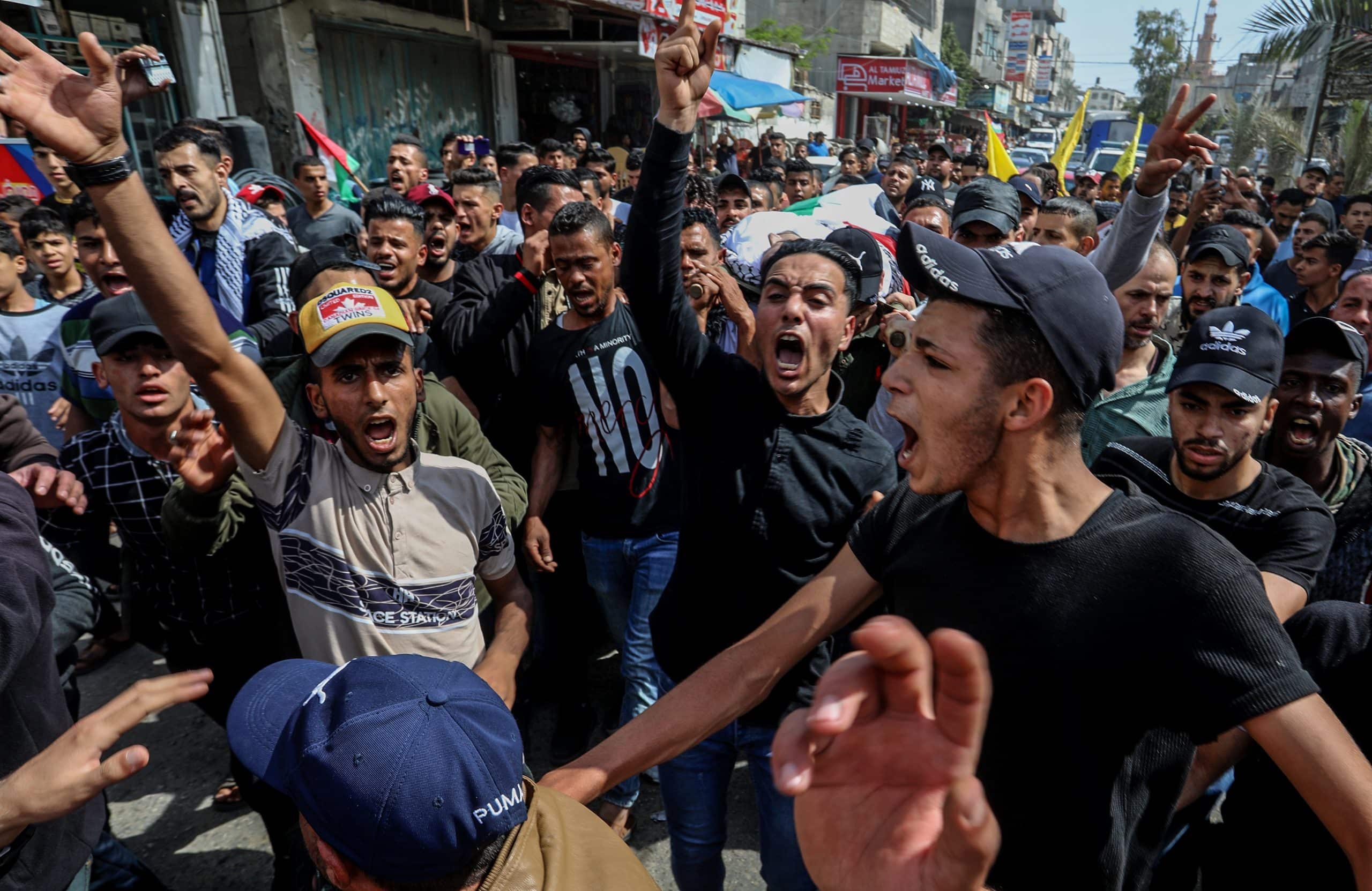
Terrorist organizations trade weapons for intelligence
How did the crime families acquire so much weaponry?
“The weapons come from a number of sources. Some are smuggled from Lebanon, Jordan, and the Judea and Samaria area, and even from military bases, which are being broken into all the time. There’s also cooperation between the terrorist organizations and the criminals. The crime families receive weapons and they pay the terrorists with intelligence, with free entry into Israeli territory, and otherwise.”
How is Israel supposed to deal with this?
“The laws have to change. For carrying firearms, for extorting protection money, for membership in a crime family, and so on, the penalties should be much stronger. In the USA, just for belonging to a crime family you can receive a life sentence, and if you’re the head of the family you’ll serve it out. Here, the head of a crime family receives two to three years, or even less. Also, the laws of evidence need to allow more tools for the police, and the ISA needs to be brought in to deal with illegal weapons. Since the start of 2024, more than 70 Israeli Arabs have already been murdered. In 2023, there were 244 murdered, which averages more than one murder per two days. That problem can easily spread outward from the Arab sector.”
What happened after Rabbi Ovadia Yosef’s car was stolen
The flow of weaponry to terrorist and criminal organizations can be attributed, says Yanir Melech, to the Oslo Accords. “Giving them guns was a mistake. Rabin said that if the barrels were ever swung back at us, we’d put an end to it. But those were empty words, because clearly you can’t retrieve 5,000 Kalashnikovs. And what’s more, as soon as the floodgates were open, thousands more weapons flowed into Judea and Samaria. When the suicide terror attacks began, we saw that with one hand the Palestinian Authority was abetting those attacks while with the other one it was shaking hands for peace. Also, the Oslo Accords included matters of general security such as suppressing auto theft. But from a shallow point of view, the state and the insurance companies profit from those thefts, while the harm is primarily to the individual’s wallet and personal security.”
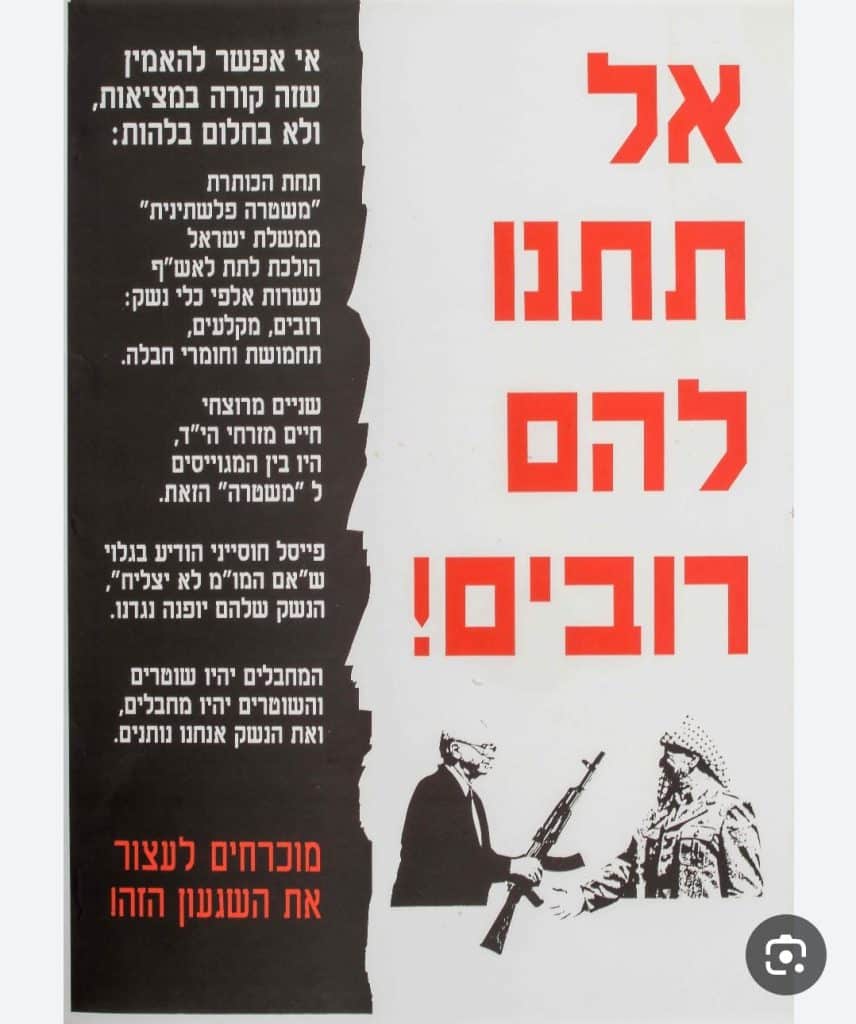
Is the Palestinian Authority responsible for this?
“Certainly. I’ll tell you a story. One time, Rabbi Ovadia Yosef’s car was stolen. A message was passed to Jibril Rajoub, and he was able to get the car returned immediately. How does that happen? We simply accepted understandingly that the Palestinians were not going to stop their offenses of all kinds against Israelis — counterfeiting, theft, burglary. They broke into the Ministry of Health’s emergency stores and stole life-saving medicines. They broke into army camps and stole rifles. We tolerate it because it can be classified as ordinary crime, but it’s really part of their nationalist preparations for the day of reckoning.”
And all that weaponry wasn’t out there before the Oslo Accords?
“That’s right. When I left the security services, there were almost no weapons in Judea and Samaria. The Black Panther squad — the operational arm of Al-Fatah in Judea and Samaria in the 1980s — was armed with box cutters. The professionals got a commando knife. Here and there we saw firearms, but they made a point of hiding them well because anyone carrying a gun had no right to live. But under the Oslo Accords, we had to furnish the Palestinian security forces with firearms, and since then weaponry has flowed into every corner of their territory, with no supervision. Today the people from the Lion’s Den squad of Nablus are armed like Sayeret Matkal raiders, with all the tactical equipment. Our security services have lost all control over the quantity of weapons in Judea and Samaria, and inside Israel.”
Why doesn’t the IDF mount targeted operations against them?
“Until October 7, the IDF wasn’t using its abilities in Judea and Samaria. The largest recent operation in that period was Home and Garden, last July in Jenin, when 11 terrorists were killed. Since October 7, the IDF has killed 450 terrorists and arrested another 3,500. Matters weren’t supposed to reach that point. Now we should stop allowing the armed marches that are being held in Tulkarm and in the West Bank cities. And we haven’t even talked about the Disengagement and what happened in Gaza.”
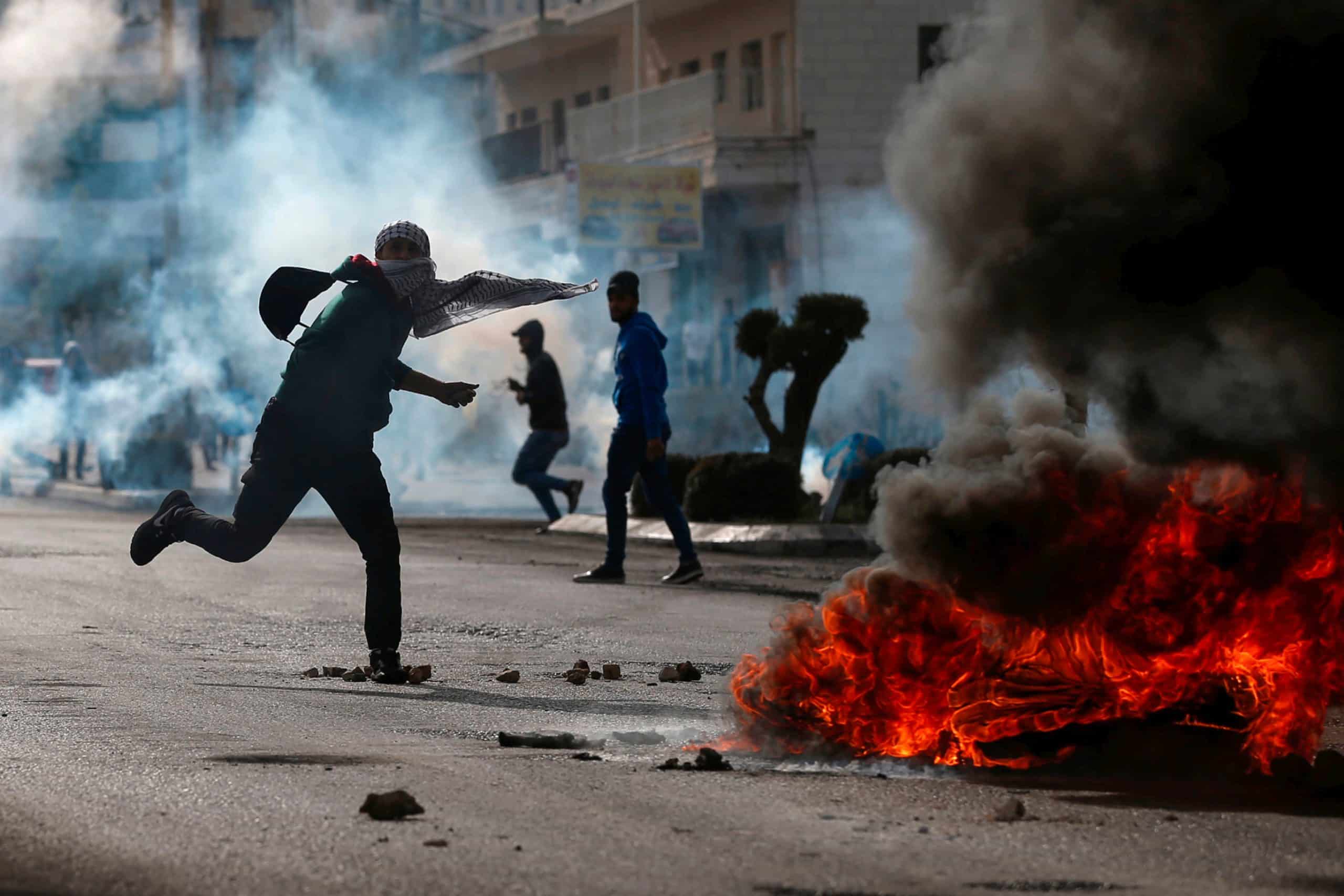
Has Israel learned its lesson from the Oslo Accords?
The Oslo Accords, says Yanir Melech, are the root of all the evil, but the problem started earlier, with the protests urging an IDF withdrawal from Lebanon, and then from Gaza. “People were shouting ‘Why is a whole battalion of paratroops guarding the village of Netzarim in Gaza?’ So we withdrew from Lebanon and from Gaza and now instead of one battalion there are five divisions in Gaza and they’re not enough. In this neighborhood we live in, if you’re not using your fists every day, you don’t survive. The dream of reconciling with our enemies has to be shelved. In his time, Fuad Ben-Eliezer, who was a cabinet minister, said it’s possible to live with rockets fired at Netzarim but a Qassam rocket hitting Sderot is another story. Since then, more than 50,000 rockets have been fired into Israeli territory and in the attempt to appease the enemy, there was an agreement signed with Hamas that stopped targeted killings by Israel.”
And you’d say that the Disengagement was rooted in the existence of the Oslo Accords?
“We have to remember that the Oslo Accords were part of the PLO’s ‘Doctrine of Stages,’ which was not about the ‘Territories’ at all. To the Palestinians, Palestine is from the river to the sea, meaning above all else Jerusalem, Tel Aviv, Haifa, Acre, Ashkelon. In the first Palestinian National Charter, from January 1964, Article 24 says that the PLO will have no sovereignty over the West Bank, which Jordan controlled at the time, or over the Gaza Strip, which Egypt controlled, or over the Himmah area in the Golan Heights. So what liberating Palestine means is liberating it from the Jews. The ambitions of the Palestinians are focused on Israeli territory inside the Green Line. To the Palestinians, we are all settlers, wherever we are in the country. Including, most ironically, those of us living in Tel Aviv.”
Do you think supporters of the Oslo Accords are beginning to reconsider after October 7?
“Every week, I travel to the north or south to bring the soldiers something of home and whatever they need, and on one drive south I was joined by a kibbutz member who’d been evacuated from the north. When we entered Kfar Aza and Be’eri, he said to me: ‘You know, if Israel had gone to war on the evening of October 6, I’d have been the first one out to demonstrate against that war.’ Until we experienced October 7, there were those of us who didn’t understand that we need to eliminate Hamas.”
But now they’re beginning to understand, right?
“When Hamas set out on October 7, there were two things it left out of account: one is that despite all our internal conflicts, we Israelis would curl into one fist against attack. The other is that we really will follow through on our decision to pulverize Hamas.”

